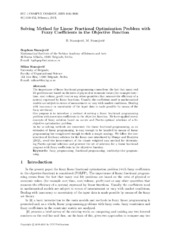Please use this identifier to cite or link to this item:
https://rfos.fon.bg.ac.rs/handle/123456789/1160Full metadata record
| DC Field | Value | Language |
|---|---|---|
| dc.creator | Stanojević, Bogdana | |
| dc.creator | Stanojević, Milan | |
| dc.date.accessioned | 2023-05-12T10:42:09Z | - |
| dc.date.available | 2023-05-12T10:42:09Z | - |
| dc.date.issued | 2013 | |
| dc.identifier.issn | 1841-9836 | |
| dc.identifier.uri | https://rfos.fon.bg.ac.rs/handle/123456789/1160 | - |
| dc.description.abstract | The importance of linear fractional programming comes from the fact that many real life problems are based on the ratio of physical or economic values (for example cost/time, cost/volume, profit/cost or any other quantities that measure the efficiency of a system) expressed by linear functions. Usually, the coefficients used in mathematical models are subject to errors of measurement or vary with market conditions. Dealing with inaccuracy or uncertainty of the input data is made possible by means of the fuzzy set theory. Our purpose is to introduce a method of solving a linear fractional programming problem with uncertain coefficients in the objective function. We have applied recent concepts of fuzzy solution based on a-cuts and Pareto optimal solutions of a bi-objective optimization problem. As far as solving methods are concerned, the linear fractional programming, as an extension of linear programming, is easy enough to be handled by means of linear programming but complicated enough to elude a simple analogy. We follow the construction of the fuzzy solution for the linear case introduced by Dempe and Ruziyeva (2012), avoid the inconvenience of the classic weighted sum method for determining Pareto optimal solutions and generate the set of solutions for a linear fractional program with fuzzy coefficients in the objective function. | en |
| dc.publisher | Agora University | |
| dc.relation | info:eu-repo/grantAgreement/MESTD/Technological Development (TD or TR)/36006/RS// | |
| dc.relation | info:eu-repo/grantAgreement/MESTD/Technological Development (TD or TR)/32013/RS// | |
| dc.rights | openAccess | |
| dc.rights.uri | https://creativecommons.org/licenses/by-nc/4.0/ | |
| dc.source | International Journal of Computers, Communications and Control | |
| dc.subject | multi-objective programming | en |
| dc.subject | fuzzy programming | en |
| dc.subject | fractional programming | en |
| dc.title | Solving Method for Linear Fractional Optimization Problem with Fuzzy Coefficients in the Objective Function | en |
| dc.type | article | |
| dc.rights.license | BY-NC | |
| dc.citation.epage | 152 | |
| dc.citation.issue | 1 | |
| dc.citation.other | 8(1): 146-152 | |
| dc.citation.rank | M23 | |
| dc.citation.spage | 146 | |
| dc.citation.volume | 8 | |
| dc.identifier.doi | 10.15837/ijccc.2013.1.178 | |
| dc.identifier.fulltext | http://prototype2.rcub.bg.ac.rs/bitstream/id/73/1156.pdf | |
| dc.identifier.rcub | conv_3341 | |
| dc.identifier.scopus | 2-s2.0-84902182637 | |
| dc.identifier.wos | 000312043600016 | |
| dc.type.version | publishedVersion | |
| item.cerifentitytype | Publications | - |
| item.fulltext | With Fulltext | - |
| item.grantfulltext | open | - |
| item.openairecristype | http://purl.org/coar/resource_type/c_18cf | - |
| item.openairetype | article | - |
| Appears in Collections: | Radovi istraživača / Researchers’ publications | |
SCOPUSTM
Citations
32
checked on Nov 17, 2025
Page view(s)
12
checked on Dec 28, 2025
Google ScholarTM
Check
Altmetric
This item is licensed under a Creative Commons License


